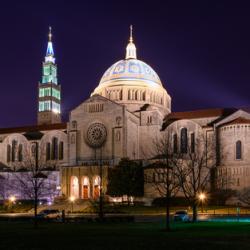 In this modern age, where relativism is deeper than the air we breathe, the desire to hold onto Truth has devolved into holding onto taste. Arguments are fierce online and in real life about our faith and threaten to turn the Church into a church. The devil loves these sort of internal Catholic feuds, because they pit us against ourselves and erode the witness of being Catholic to a flavoring rather than a faith.
In this modern age, where relativism is deeper than the air we breathe, the desire to hold onto Truth has devolved into holding onto taste. Arguments are fierce online and in real life about our faith and threaten to turn the Church into a church. The devil loves these sort of internal Catholic feuds, because they pit us against ourselves and erode the witness of being Catholic to a flavoring rather than a faith.
The disputes run across the spectrum: which form of the mass, how do we fight against the tide of the time? The music must be just so. How we must receive? Who can receive? What is the role of the laity? What is the role of the Catholic school? The Catholic hospital? The Catholic University? Catholic art? Left or right? Fr. Martin? Bishop Baron? Register or Reporter?
The fights on the internet over who is good and who is bad, which bishops are holy and which should be excommunicated, over the Pope, over the pundits, over all of it remind us that we are very good at pretending we know what’s best for everyone else. We’re very good at repeating the mistakes those who said, “there is no room in the inn,” made when offered the opportunity to host the Holy Family. The Catholic church is to be universal, both and, not a clone club or a cult, where our personalities are trampled beneath rules.
Our litany of saints reveals the manifestation of God’s hope for each of us, to be fully rendered as who we were called to be. We do not follow Christ by demanding everyone else follow us. We follow Christ by following Christ.
Perhaps it is because I live near the beltway (DC) that the tribalism of my way or the high way is more intense. We band together and affiliate, with the presumption always of being on the sides of angels, on the side of Christ. None of us want to identify with “Thank goodness I’m not like that sinner over there,” but all of us should, most especially as we then indicate why we’re not that sinner over there. That’s precisely when we’re going home with our sins not forgiven, because we’ve refused to admit they exist or that they’re actually bad or that we’re not in need of extreme grace and salvation.
That’s why I love being Catholic, because we are reminded every year, that we were part of the crowd that cried, “Crucify Him,” despite being part of the fed five thousand. We are the woman at the well that Christ tells everything she’s ever done, and the blind man. We are all the both and, the followers who do not always recognize we must stop looking at others and wanting them to look at us to follow. Jesus let everyone come to Him, even those who plotted His death. Jesus let the children come. Jesus reached out to the lepers. He also ate with those who sought to use Him, reaching hearts by coming even knowing all the ulterior motives in the invitation. We all come to God with ulterior motives. We want what we want, and foolishly always presume our will is Gods –after all, we want what we want because it will make us happy and doesn’t God want us happy?
God wants us to partake in His joy –which is bigger than happiness. That’s a harder thing to embrace because while chocolate or wine or a week at the beach, a good grade, a team victory, a kiss and a party can make us happy, these things do not last. God’s promise is for something better than all of those put together, and more permanent. We must grow into being able to bear that type of joy.
If we want to know the differece between worldly happiness and permanent joy, it is akin to summer romance vs. sacramental marriage.
This:
as vs. this:
Catholics get constant reminders in the mass and in the seasons of the liturgical year that we are both the thief on the cross He promises heaven, and the rich man Jesus looks upon with love. We always struggle when we realize following Him will cost. We are the older brother and the prodigal son. Both are invited to the feast. We are Martha and Mary, friends with Jesus, but not always friendly.
We are always needing saving even as we seek and struggle and attempt to follow. Peter attempted to follow Christ after His arrest. So do we. Peter denied Him; so do we. We are Judas, being lured by a desire for a better plan or a different plan, for a plan that gets honor and glory and ease and success without end and without effort. We’d prefer success without effort. It takes effort to not throw stones; effort to break down roofs and ask for help; effort to follow Christ to the cross.
So how do we stop leading ourselves and others astray even as we seek to be faithful in our practice of the Faith?
1) Love Christ first, last and always.
2) Spend your energies on removing not just the splinters but the planks from your own eyes. (Believe there are planks for a start).
3) Do not confuse guilt with repentance, or having acknowledged faults with humility.
4) Recognize that everyone else is also groping about, and that God knows this and wants them home too.
5) Pray, love and serve. That’s your job. That’s all of it. It will take all of you.
Throw open your heart to the Holy family, and recognize, it is only by grace that we agree to open that door to God. Pray for the ongoing receiving of that grace, for yourself and everyone, most especially those you find most disagreeable. It is hard to recognize, that as Pogo said, “We have met the enemy and it is us.”
We’re supposed to want everyone at the table, and we’re supposed to be about the work of making our witness so inviting, they want to come. We cannot do that by force or by rule or by law or by smug rightness about argument or understanding of the catechism. We can know all of it to be right, but if we do all of it without love, it is without worth. The ones we say should leave, should not come, should not seek, should not be seen, should not be heard, should not be helped, these are the ones we should be serving first and foremost.

Ask that they be seated nearer. That’s the prayer and the hard work of loving everyone and being a follower of Christ.












